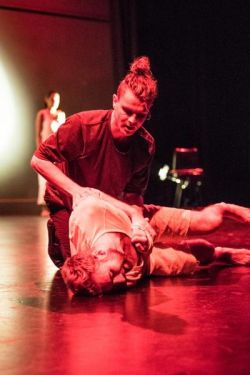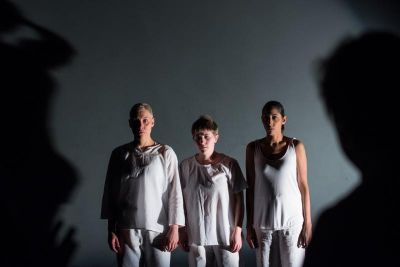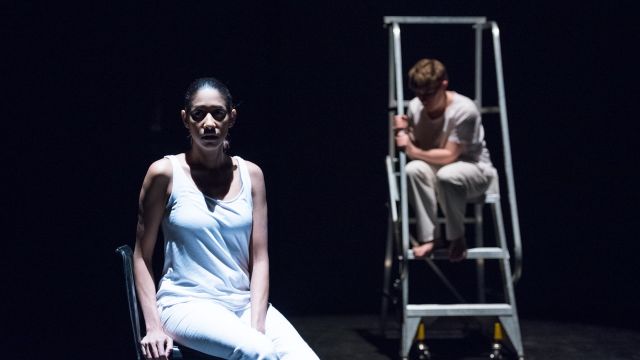4.48 Psychosis
Director Michele McNamara’s intention for Sarah Kane’s 1999 play (first performed in 2000) is to depict ‘a world where we can see what we feel’. In this, she largely succeeds. It’s a play ‘about’ the experience of clinical depression and the aim, for this director, is to take us into the world of mental illness. Ms McNamara’s direction gives us sequences of striking tableaux and urgent, frenetic movement created by her young cast and enhanced by Jason Bovaird’s expressionistic light design and Matt Brown’s (mbryo) music and sound.
Through the choreography and groupings of bodies, we see images – real and metaphoric - of rage and of fear, of carrying the burdens of the past, of the loneliest isolation, of the yearning for love, of the towering frustration at not being understood, at the chemical solutions of hit-and-miss defeated doctors, and of suicidal depression.
 The text has no explicit characters or stage directions, so the burden falls on the director to give form to and make sense of the text’s twenty-four sections. There is a ‘doctor’ (Pearce Hesling) and there is a ‘patient’, but Ms McNamara divides ‘patient’ into four – that is, the ‘patient’ is portrayed by four actors (Laila Thaker, Catherine Holder, Stephanie Pick and Andy Aisbett). This seems like a wise decision (or calculation, if you like) as what is already a confrontational, painful piece might well be unbearable were all the rage and misery to be carried by one actor over sixty minutes.
The text has no explicit characters or stage directions, so the burden falls on the director to give form to and make sense of the text’s twenty-four sections. There is a ‘doctor’ (Pearce Hesling) and there is a ‘patient’, but Ms McNamara divides ‘patient’ into four – that is, the ‘patient’ is portrayed by four actors (Laila Thaker, Catherine Holder, Stephanie Pick and Andy Aisbett). This seems like a wise decision (or calculation, if you like) as what is already a confrontational, painful piece might well be unbearable were all the rage and misery to be carried by one actor over sixty minutes.
Each of the cast has greater or lesser success in communication with the audience, depending on the content of their ‘sections’. Ms Thaker can project an almost ethereal, delicate quality and evoke a touching pathos, while Mr Aisbett finds power in frustrated anger. Ms Holder has what looks like a stubborn obduracy that is actually an inability to communicate, while Ms Pick is most touching when denied love. I’m afraid I’m not convinced by Mr Hesling as the ‘doctor’. Although he conveys sincerity mixed with the frustration of a professional who knows he’s cannot help, he seems too young for the role (or ‘type’, since that is what the ‘doctor’ is) and his ‘man bun’ is quite disconcerting.
The ‘4.48’ of the title is the hour at which Sarah Kane woke each morning, locked in her own clinical depression. Kane, a leading dramatist of her generation, committed suicide before the play’s first production, so, knowing that, it is almost impossible to see the text as anything but autobiographical (even a ‘suicide note’). But can’t be minimised as the cliché ‘cry for help’; it’s rather an attempt to describe and evoke how someone feels when clinically depressed – and feels there is no escape.
But let us suppose that we don’t know that and see the text here as simply a text for performance. Seen as such, there is minimal narrative development, it can seem emotionally repetitious – and therefore wearying - and the ‘poetic’ or abstract nature of much of it creates difficulties of expression for these committed but somewhat inexperienced players.
 The images created by the cast, lighting and soundscape have more impact than the spoken text. But even there the playing space does tend to lessen the power of those images. Ms McNamara has chosen to use all of the rather vast and hangar-like Gasworks stage. While this enables a greater scope for movement, complex emotions and expressions can be swallowed up; the play’s shocking intimacy calls out for something more contained. (The first production in 2000 was at the Royal Court Upstairs, a more intimate space than here.) Added to the this, the Gasworks stage has bad acoustics: some text gets lost and some is overwhelmed by the sound design, good as it is.
The images created by the cast, lighting and soundscape have more impact than the spoken text. But even there the playing space does tend to lessen the power of those images. Ms McNamara has chosen to use all of the rather vast and hangar-like Gasworks stage. While this enables a greater scope for movement, complex emotions and expressions can be swallowed up; the play’s shocking intimacy calls out for something more contained. (The first production in 2000 was at the Royal Court Upstairs, a more intimate space than here.) Added to the this, the Gasworks stage has bad acoustics: some text gets lost and some is overwhelmed by the sound design, good as it is.
Nevertheless, this is a brave production of an extremely difficult text and where it mostly succeeds, it is indeed moving and does help us to understand or indeed to recognise hidden or alien emotions.
Michael Brindley
Photographer: Sarah Steiner
Subscribe to our E-Newsletter, buy our latest print edition or find a Performing Arts book at Book Nook.

